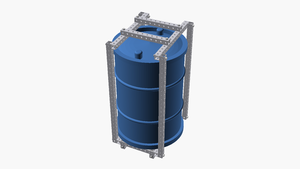Odd parts first: Difference between revisions
From
No edit summary |
No edit summary |
||
| Line 1: | Line 1: | ||
{{Techniques infobox | |||
[[ | |image = Barrel-cage.png | ||
|designer = [[User:Tim|Timothy Schmidt]] | |||
|date = 2019 | |||
|tools = [[Wrenches]] | |||
|parts = [[Frames]], [[Nuts]], [[Bolts]], [[End caps]], [[Barrels]] | |||
|techniques = [[Tri joints]], [[Shelf joints]] | |||
}} | |||
=Introduction= | =Introduction= | ||
| Line 11: | Line 17: | ||
* offset a frame with stacked washers to match an existing hole pattern, or an adapter plate where an all-frame construction isn't possible. | * offset a frame with stacked washers to match an existing hole pattern, or an adapter plate where an all-frame construction isn't possible. | ||
* cage the part | * cage the part | ||
<gallery> | <gallery> | ||
Offset_frame.jpg| | |||
</gallery> | </gallery> | ||
=References= | =References= | ||
Revision as of 01:50, 28 March 2021
Technique: Odd parts first
| Tools: | Wrenches |
|---|---|
| Parts: | Frames, Nuts, Bolts, End caps, Barrels |
| Techniques: | Tri joints, Shelf joints |
Introduction
Almost every project requires at least one part which doesn't conform easily to the replimat grid. This part is often central to the purpose of the project.
Challenges
Unique parts may not have easy mounting points or compatible hole patterns. Adapting them to the replimat grid can be a challenge.
Approaches
- offset a frame with stacked washers to match an existing hole pattern, or an adapter plate where an all-frame construction isn't possible.
- cage the part

